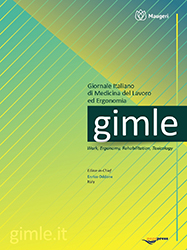Job insecurity, subjective well-being and the moderating role of locomotion
[Insicurezza lavorativa, benessere soggettivo e ruolo moderatore della locomozione]
All claims expressed in this article are solely those of the authors and do not necessarily represent those of their affiliated organizations, or those of the publisher, the editors and the reviewers. Any product that may be evaluated in this article or claim that may be made by its manufacturer is not guaranteed or endorsed by the publisher.
Authors
This paper addresses the moderating role of locomotion – a functional and fundamental dimension of self-regulation – in the relationship between job insecurity and subjective well-being. A group of 205 adult Italian workers took part in the research by filling out an anonymous questionnaire that included measures of job insecurity, locomotion, satisfaction with life, positive and negative affect. Results showed that job insecurity was positively related to negative affect and negatively related to life satisfaction and positive affect. Locomotion was positively related to life satisfaction and positive affect and acted as a moderator only in the case of the link between job insecurity and negative affect. This means that when perceived insecurity is high, negative affect is lower for respondents scoring high versus low on locomotion. Results and suggestions for future studies are presented and discussed.
How to Cite

This work is licensed under a Creative Commons Attribution-NonCommercial 4.0 International License.
PAGEPress has chosen to apply the Creative Commons Attribution NonCommercial 4.0 International License (CC BY-NC 4.0) to all manuscripts to be published.






